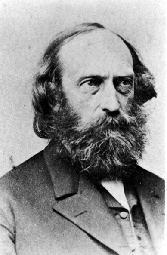|
Stephen Pearl Andrews
Stephen Pearl Andrews (March 22, 1812 – May 21, 1886) was an American libertarian socialist, individualist anarchist, linguist, political philosopher, and outspoken abolitionist.[1] LifeAndrews was born on March 22, 1812 in Templeton, Massachusetts.[1][2] His father, Elisha Andrews, was a Baptist clergyman and revivalist.[1][2] He graduated from the Classics department at Amherst College.[3] He studied law and was admitted to the state bar in 1833.[3] He moved to New Orleans where he became a wealthy lawyer and slaveowner.[1] He was converted by abolitionism and became an abolitionist leader.[1] He moved to Houston, Texas in 1839.[3] He was a prominent advocate for abolitionism in the Republic of Texas and an active member of the Liberty Party.[1] Andrews was mobbed for his abolitionist rhetoric in Texas, prompting him to leave the state in 1843 for England.[3] In England, he sought funds to buy slaves in the United States in order to free them.[2] By the end of the 1840s, Andrews began to focus his energies on utopian communities. Fellow individualist anarchist Josiah Warren was responsible for Andrew's conversion to radical individualism and in 1851 they established Modern Times in Brentwood, New York. He was elected an Associate Fellow of the American Academy of Arts and Sciences in 1846.[4] In 1857, Andrews established the Unitary Homes on East 14 St. and Stuyvesant St. in New York City.[5] Andrews was a supporter of the woman suffrage movement.[3] ThoughtIn the 1870s, Andrews promoted Joseph Rodes Buchanan's psychometry besides his own universology predicting that a priori derived knowledge would supersede empirical science as exact science.[6] Andrews was also considered a leader in the religious movement of spiritualism.[2] Anarcho-syndicalist Rudolf Rocker called Andrews a significant exponent of libertarian socialism in the United States.[7] Andrews' individualist anarchism is a form of economic mutualism.[8] Personal lifeIn 1835, he married Mary Ann Gordon, with whom he had four children.[3] He died at the residence of his son in New York City on May 21, 1886.[2] Works
Notes
Further reading
External links
|
|||||||||||||||||||||||||||||||||||||||


